Disclosure: Meeple Mountain received a free copy of this product in exchange for an honest, unbiased review. This review is not intended to be an endorsement.
The most colorful game box I’ve ever gotten in the mail arrived and I got super excited.
Décorum, designed by Harry Mackin, Charlie Mackin, and Drew Tenenbaum, is almost as colorful in its gameplay as its wild box cover design by Michael Mateyko. Published by Floodgate Games (Sagrada), Décorum requires a funny partner and/or friends willing to work through a logic puzzle where everyone is trying to get what they want without telling you what they really need.
Décorum comes with a whopping 20 scenarios for 2 players to work through in a campaign-style experience. It also includes 10 3-4 player scenarios that can be played in any order. With 30 scenarios in the box, you’ve got at least 20 hours of content here.
That’s a lot of game for a light-to-medium weight puzzle experience. In fact, it might be just a little too much.
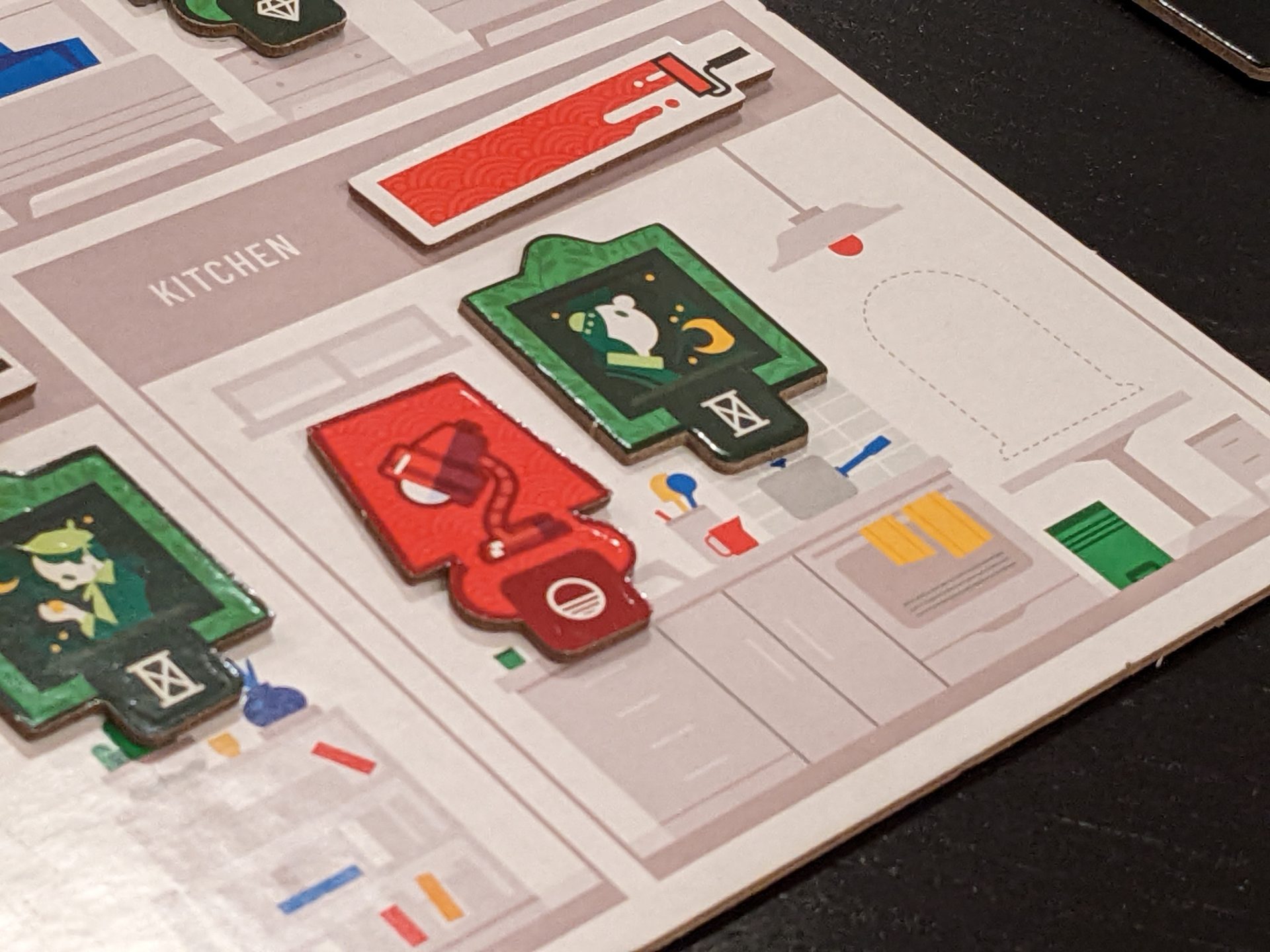
Quick/Start
Décorum is a party game that labels itself “a game of passive aggressive cohabitation.” This lighter touch, mixed with the conditions that need to be met in order for all players to win, makes the game much more accessible than other excellent logic puzzle games like The Search for Planet X or Awkward Guests.
That’s a testament to the design; the game can literally be taught from the Quickstart Guide that serves as the cover. In a twist, this guide is on the front and not the back page of the instruction manual.
In Décorum, players are living together in a 4-room house, and they need to decorate it. Everyone has their own objectives, and to simplify life, those objectives are tied to a mix of how the house can be arranged. All rooms can be painted, and all rooms have 3 empty slots available for a mix of lamps, “curios”, and wall hangings, all of which are available in 4 styles, such as “unusual” or “retro.”
Players will select one of the scenarios from the box, labeled with a title and difficulty that ranges from 1-3 stars. After using a setup card to arrange the starting conditions of the house—a lamp in the living room maybe, or a blue bedroom with a red retro lamp—each player is given a list of conditions that need to be met in order to feel “fulfilled”, the term the game uses to say that a player has met their win condition.
Over the course of 30 rounds, each player will take one of 4 actions, or pass if they are fulfilled:
- Place an object in a room.
- Remove an object from a room.
- Swap an object from a room back to the supply for a matching type (so, swapping that red retro lamp out for a blue unusual lamp in the same room position the red lamp held)
- Paint a room.
Once a player has made a change to a room, they then ask the other players what they think.
Everyone has the chance to be really creative here, but they absolutely cannot drop specifics about how that change may affect the conditions on their card. So, you’ve got to play it safe: “I love it!” or maybe “meh, I’m indifferent on that one.” You can’t say things like “taking that red lamp away really messes with my win condition.”
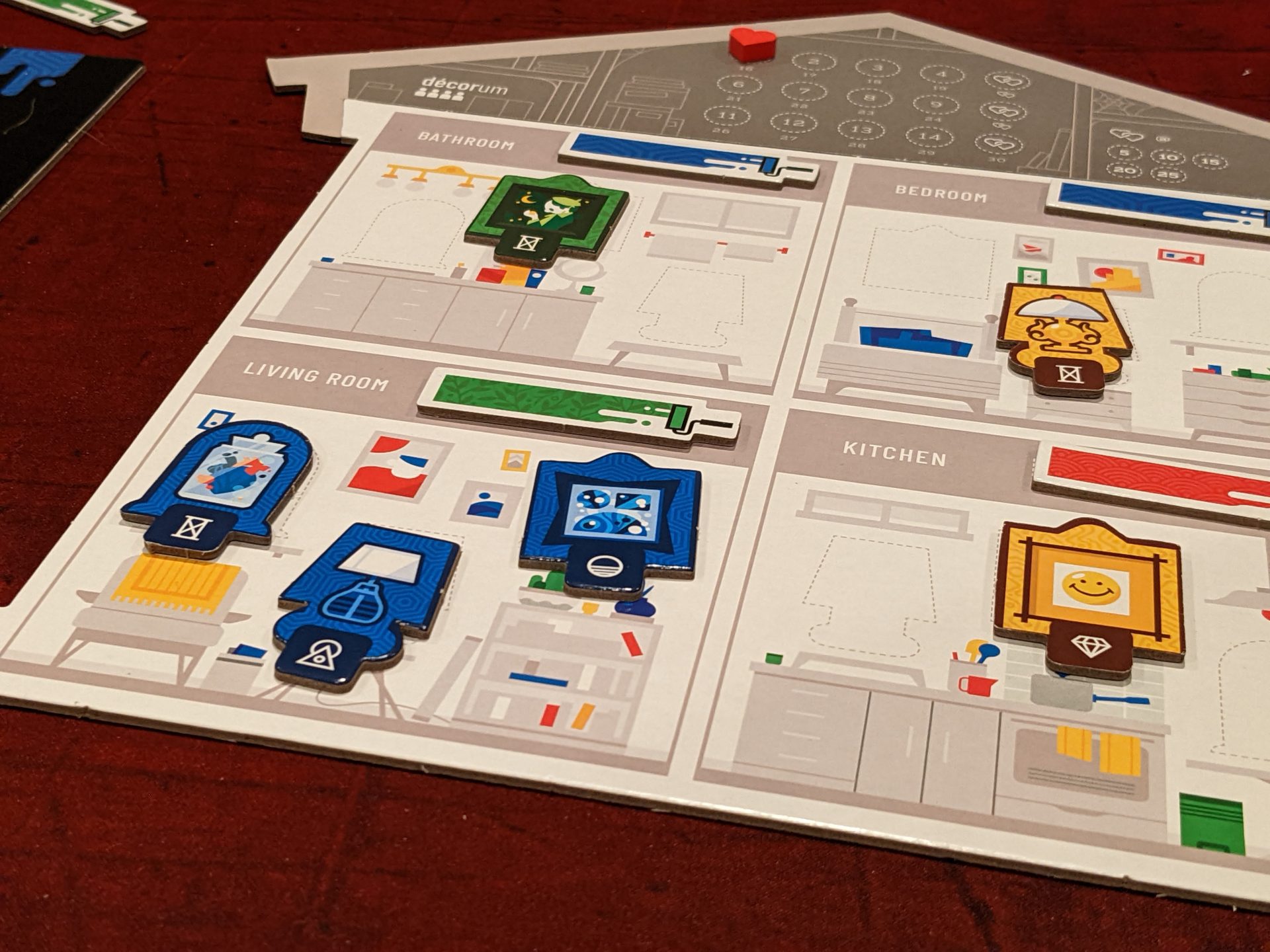
Passive-aggressive, right? You might really hate the change another player makes, but you can’t tell them why. (I’m married. Everything about this game hits a little too close to home.)
Assuming that the players don’t all feel fulfillment, a round concludes when each player has made a single change to the house.
Feeling like you can’t quite figure out what each player is really looking for? Good news: every so often, you will have a “Heart-to-Heart” with your partner (also known as a “House Meeting” when there are 3-4 players in the game). This is the time when you can share one of your conditions with one other player, in the form of a small card that has the same text your larger condition overview card has listed.
This way, you won’t forget what you are supposed to be working towards, and now your partner has a little more insight into why you keep fighting to keep all of those [blank] in the [blank] each time you take a turn!
Play continues like this until everyone is fulfilled, or you reach round 30. Then scoring takes place: 3 points for every condition met, and bonus points for every Heart-to-Heart you have not needed. Décorum turns into a high-score contest; “winning” is usually possible, if not downright easy, but can you do it as quickly as possible?
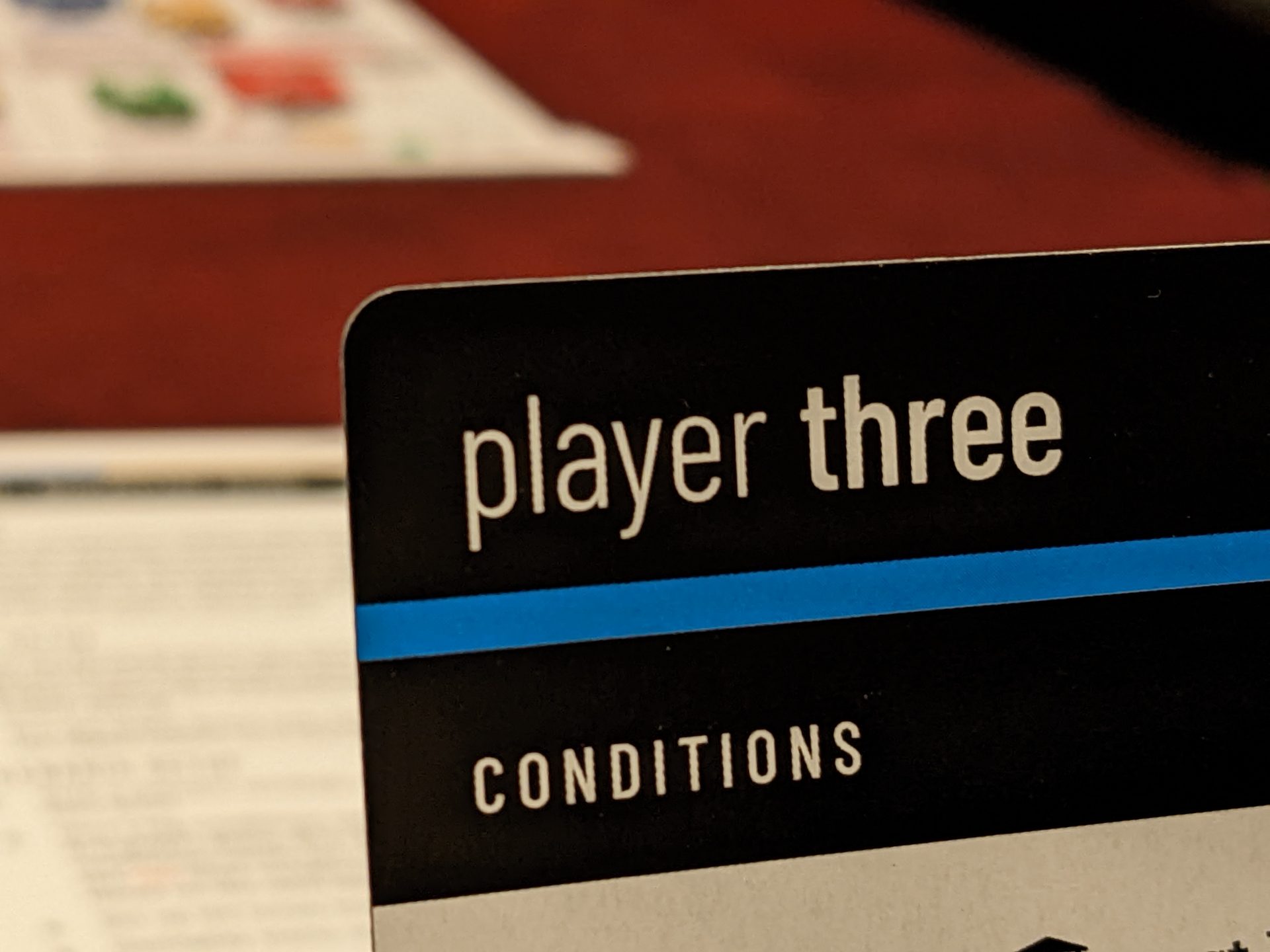
Nail the Audience
My first game of Décorum was with 2 other friends, one of whom I’ve known for a long time. It was an incredible first play because every time we took an action, we found a way to creatively (and usually, profanely) talk about how a single change to the house made us feel.
Me: “Guys, I’m thinking that…this…might work. What do you think?”
Guy A: “I ******** hate that you did that.”
Guy B: “I don’t mind that as much as Guy A did, but still, you need to start paying the ******* rent on time freeloader.”
And on and on. In fact, while the gameplay was excellent, the experience and the smack talking might have trumped anything that happened during the game. This is a good thing, assuming you have the right audience. We also scored 40 points (out of a possible 46), so we were feeling pretty good because that scenario, “Three’s a Crowd”, was fairly straightforward and we all like logic puzzles.
But even during this first game, I could tell: will I still be laughing after 10 plays? 20? 30??? That’s a lot of games where I’m trying to decipher where my wife wants to put that lamp. And this is a game, not even my real-life struggles where my wife and I can’t agree where to put our sectional in front of the large-screen television.
My next 4 plays confirmed these initial fears. My second game was with 2 different players who weren’t as excited to trade banter as I was. My next 3 games were with my wife, and while games were snappy (10-20 minutes each), she wasn’t as excited to engage in chatter as I was.
Me: “So, I’m thinking that…this…might work. What do you think?”
Wife: “It’s fine. It’s my turn now?”
And this was in the first game we played together. From there, she wasn’t as excited as I was to move through turns. That really hurts the experience, and then I thought:
What are we going to be doing during game 18? Or round 26 in game 4???
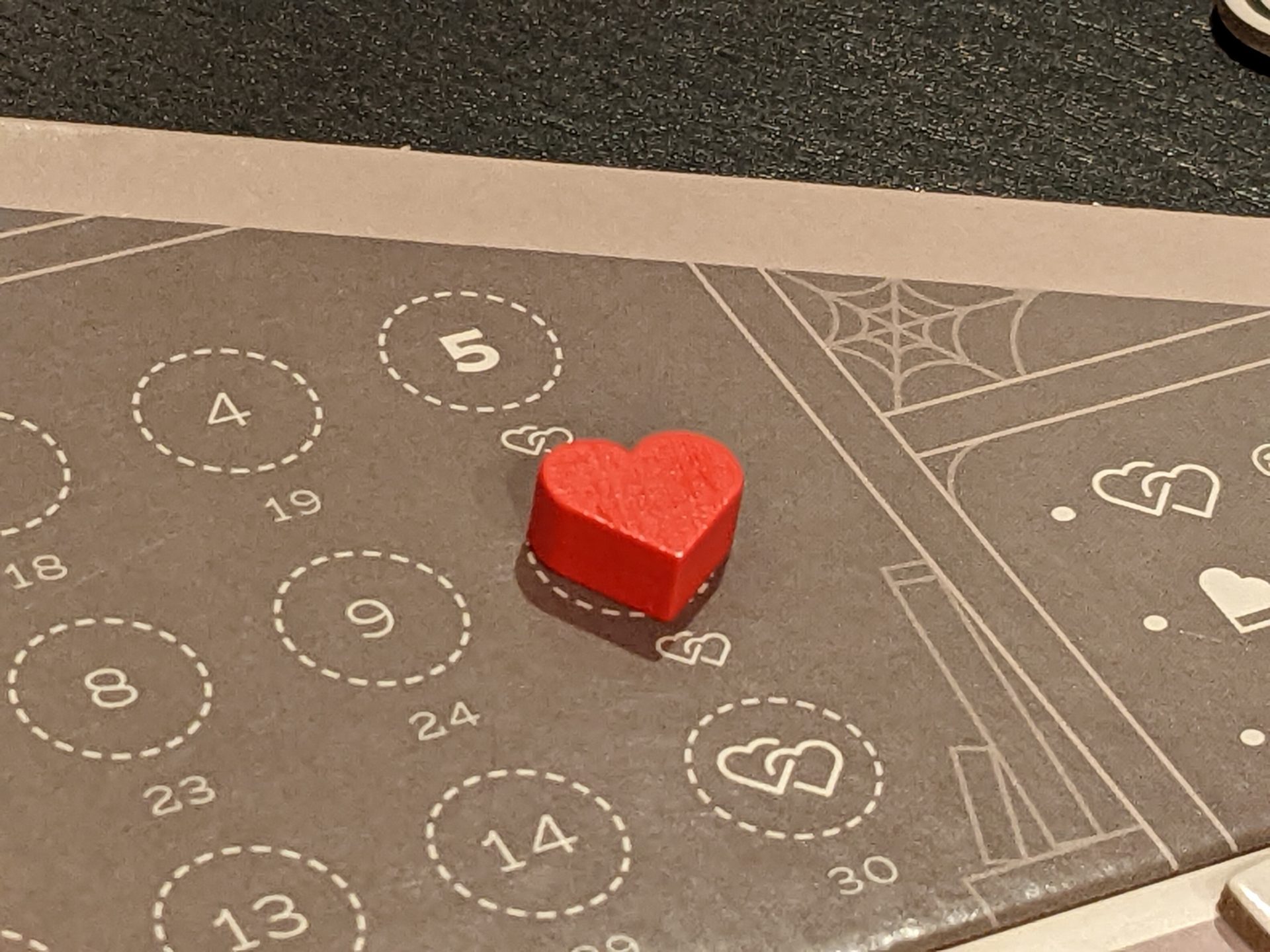
Diminishing Returns
Décorum flies out of the gate. It’s easy to teach, it’s a puzzle right-sized for almost any audience, and co-op gamers will be right at home working together to make your “house” look good.
But the game’s legs vary widely. If you have the right partner for this—Décorum is absolutely best played as a 2-player game—there’s plenty in the box and there will be surprises along the way. If you are going to play this as a party game, you really have to buy into the setup and I think it works better at 4 players than 3, based on a condition of how the required fourth player appears in each game.
You really have to nail the people part of this game to make it shine. Even then, I’m not sure you will be able to keep things fresh through 30 plays.
This is an abstract logic puzzle that doesn’t require any backstory. However, for reasons that really baffled my wife and I, Décorum has a brief story setup for each scenario.
Why? None of the text is particularly well written. None of the story carries over from game to game. None of each scenario’s setup text plays into the game; for example, you’ll never gather hints about what each player wants when they read their individual background flavor text. In the 2-player game, each player has a name on their conditions card. In the 3- and 4-player games, each player is just named Player One, Two, etc.
Décorum ended up being just fine. My hopes and dreams for the game were dashed by my third play; fine, very limited gameplay, decisions that don’t freshen considerably from game to game before changes appear to be introduced in the back half of the 2-player campaign.
There’s a deep campaign experience in Décorum for the willing and able; I’m just not willing!


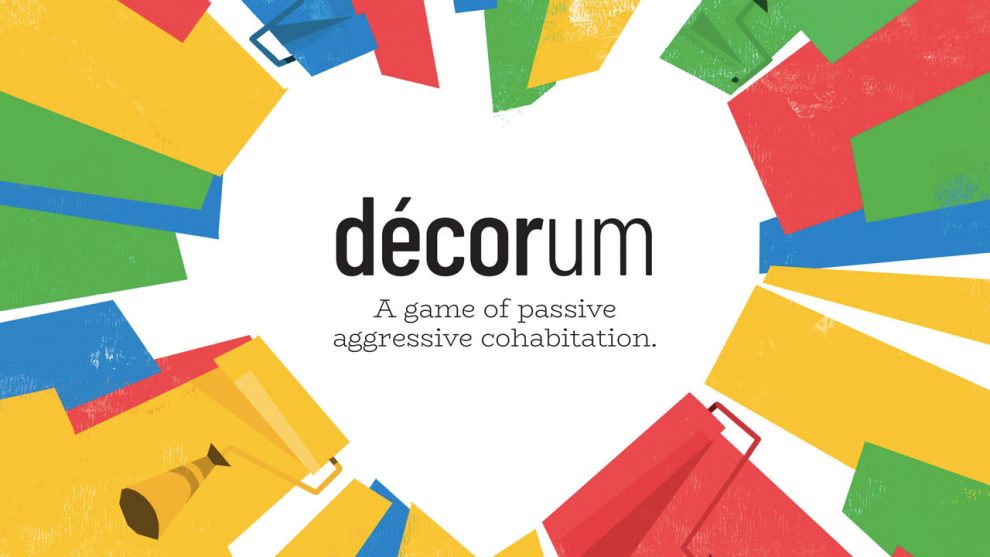
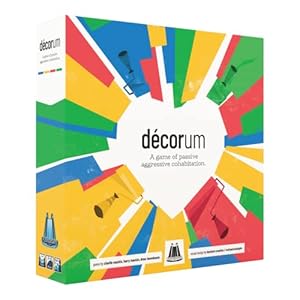








Add Comment